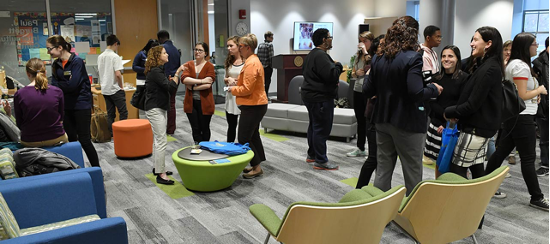Navigating Graduate School as an International Student: Overcoming Academic and Social Challenges
As a third-year international PhD student in optics at the University of Rochester, my journey has been full of challenges, but also incredible growth.

As an international student, I faced unique hurdles, and my experiences have shaped me into a more resilient researcher and individual. Here, I’d like to share some of those challenges and the lessons.
The Language Barrier
Since English wasn’t the primary language in my undergrad and master's programs, adjusting to it during my PhD was tough. I often found it difficult to follow discussions in class. It wasn’t until later that I learned about the English Language Center on campus, which offers amazing support to help non-native speakers. If you face similar challenges, don’t hesitate to seek out this resource early—it will save you time and frustration.
Transitioning from Electrical Engineering to Optics
Shifting from Electrical Engineering to Optics was no small feat. In my first year, the number of courses I had to take was overwhelming, and the homework and exams were more challenging than I expected. I struggled, but I didn’t immediately ask for help, which made things harder. Eventually, I realized that the department offers great support services, including tutoring, flexible course schedules, and more. If you’re struggling academically, don’t hesitate to reach out to your department for help. It’s also important to remember that if your grades or results aren’t as good as you hoped, don’t give up! Change your study methods, ask for guidance, and keep going. Persistence and adaptability are key, especially if you're passionate about your field. Study groups with friends can also be incredibly helpful—discussing challenging concepts together can often lead to breakthroughs.
Transition from Industry to Academia
After working in the industry for six years, transitioning back to academia was incredibly tough. I had forgotten many of the concepts I learned during my undergraduate and master’s years and keeping up with the new academic topics was overwhelming at first. Returning to the academic environment after such a long gap meant adjusting quickly so I could focus on my research and coursework. If you find yourself in a similar situation, give yourself time to adapt. Be patient, seek help when needed, and remember that it’s perfectly normal to need time to get back into the academic mindset. Don’t let the initial difficulty discourage you—gradually, it gets better.
Building Social Connections
Moving to a new country can be exciting but also isolating and making friends in a foreign environment can sometimes be challenging. You might not immediately find people who share your interests or personality, and it’s easy to feel discouraged. But don’t give up. Keep putting yourself out there and meeting new people. Eventually, you’ll build friendships that make life abroad much more enjoyable. And if some connections don’t work out, don’t let it make you feel disheartened—it’s all part of the process. You’ll eventually find the right people who fit your personality and interests. My advice is to attend events, join clubs, and participate in social gatherings. Socializing makes the PhD journey much more fulfilling and helps balance the academic workload with meaningful relationships.
Exploring Beyond Campus: Enjoying Life in Rochester
One of the most important lessons I’ve learned is not to limit yourself to campus life. Rochester is a city filled with things to enjoy. There are plenty of beautiful parks and hiking trails nearby, and you don’t have to go far to explore nature. Whether it’s a weekend camping trip in Ithaca or a visit to nearby cities like Syracuse, there are always opportunities to take a break from academics and recharge. The city itself has a variety of restaurants where you can try different cuisines from around the world. I highly recommend taking the time to explore Rochester with your friends—you’ll find that getting to know the city can make you feel more at home. Balancing your academic life with outdoor activities and social outings will help reduce stress and make your graduate experience more enjoyable.
Final Thoughts
Graduate school is a challenging yet rewarding journey, especially for international students. But remember, you don’t have to face these challenges alone. There are numerous resources on campus—from the English Language Center to academic support services and social groups—that can help you succeed. More importantly, don’t hesitate to ask for help when you need it. Reach out to your department, your professors, and your friends. Explore the city, and don’t be afraid to push yourself out of your comfort zone. With persistence, adaptability, and a supportive community, you’ll navigate the journey successfully.
